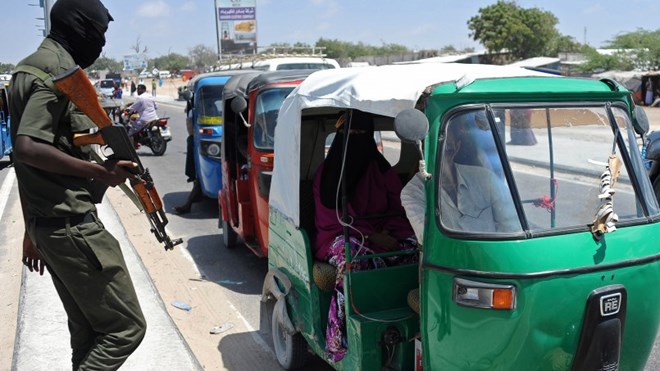Stratfor
Monday, October 03, 2016
Forecast
Somalia's elections could be pushed back yet again, but the country will not be able to postpone a power transition indefinitely.
Despite Somalia's gradual progress in developing its political system and institutions, the upcoming elections will not mark a significant achievement on its path to political stability.
The next government will encounter the same challenges as its predecessors.
Analysis
Despite its reputation as a lawless environment governed by loose clan structures, Somalia has had a federal government throughout most of the conflicts that have plagued the country since the mid-1980s. For much of that time, however, the government existed entirely outside of Somalia's borders and had barely any power over the country. Somalia's federal government returned to the country more than a decade ago, but it has not been able to extend its reach much beyond Mogadishu. Weak and decentralized political institutions have impeded the government's efforts to develop the rest of the country, even as large swaths of it have been cleared of the militant group al Shabaab.
The country's long-awaited elections — now set to take place from Oct. 23 to Nov. 10 after repeated delays — are meant to signal the start of a new era in Somalia. Billed as the first popular elections since the civil war erupted, the vote could represent a milestone along Somalia's path to stability. In reality, though, the elections will not mark a significant achievement for Somali democracy.
Not Quite a Popular Election
Even after the elections, then, Somalia will be stuck with the same kind of transitional government that has reigned since Barre was unseated in 1991. Nonetheless, some important achievements have been made. As part of the upcoming elections, the Somali parliament will adopt a bicameral system, introducing a brand new upper house in addition to a lower house structured much like the existing legislature. The upper house will consist of delegates from Somalia's diverse substates, including Puntland, Somaliland, Jubaland and Galmudug, thereby promoting closer interaction between their governments and the one in Mogadishu. In these substates, the local governments have proved themselves much more effective than the federal government and have even contributed their own local forces to the security operations throughout the country. The expansion of the federalist system in Somalia, and its incorporation into the parliamentary system, could be the country's most notable political achievement since the federal government returned to Mogadishu, but it has not been easy. Candidates to fill the upper house were supposed to have been identified by Sept. 25, but following a dispute between the substates over the distribution of seats (finally resolved Sept. 11), the date has been pushed back indefinitely.
Filling the lower house has been an even more complicated endeavor. The process, which was meant to start on Sept. 24, got bogged down in clan politics early on and has now been postponed to Oct. 23. By its very nature, the system for selecting the lower house's members — in which more than 100 clan elders are selected to nominate delegates to vote for members of parliament — entails considerable competition and political bartering between clans. Elders from each of the country's four major clans are appointed to four of every 4.5 positions in the lower house, and the remaining seats are divvied up among several minority clans.
The so-called 4.5 system is well established in Somalia. But in pitting the various clans against each other for representation, the system often results in a fractured government. The key leadership positions in the Somali government and parliament — the president, prime minister and speaker of parliament — usually go to politicians from competing clans more invested in pursuing their own interests than in forming a strong ruling coalition. Under the government of President Hassan Sheikh Mohamud, relative stability has prevailed in the ranks of the government, a stark contrast with previous administrations in which competing factions have hamstrung the Somali leadership. But the transition to a new group of leaders after the elections could usher in a new era of infighting and directionless governing. Even if Mohamud wins another term in office — something that no other Somali president has managed under the current system — other positions in his administration would probably change hands.
Old Challenges for a New Administration
Regardless of the elections' outcome, the next Somali government will face the same desperate challenges that previous governments have contended with. In fact, the elections could exacerbate the country's enduring security problems. Al Shabaab remains a significant threat in Somalia, conducting attacks in the capital while pushing Somali troops and AMISOM peacekeepers out of their bases in rural areas. Like its predecessors, the new government will have to depend on foreign support to make any security gains, or even to maintain the current situation. But AMISOM members have suggested that the landmark vote will signal a shift in Somalia's political stability and that afterward, their presence in the country will be less essential. If AMISOM reduces its involvement in Somalia, the remaining elements of al Shabaab could exploit the vacuum left in the mission's wake.
Beyond security, the Somali government will also continue to rely on foreign donors such as the European Union and the United Nations for financial support. Although the country has recovered some of its economic activity, and foreign companies have begun managing Mogadishu's seaport and airport, Somalia is nowhere near self-sustaining. Any Somali government, whatever its composition, will function primarily as a conduit for this external support, further stalling the development of the country's institutions.